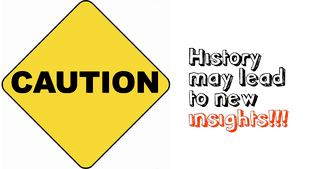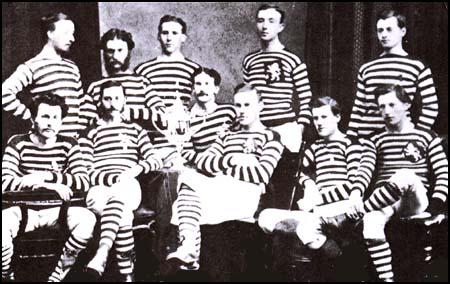
|

|
| This Web Site is dedicated to the Memories & Spirit of the Game as only Ken Aston could teach it... |
| Enjoy, your journey here on... KenAston.org |
| Ken Aston Referee Society ~ Football Encyclopedia Bible |
|
Encyclopedia of British Football ~ Football in Scotland ~ 
|
| Source - References |
| Football was played in Scotland
in the early Middle Ages. Scotland seems to be the first country in the
world to encourage women to play football. In the 18th century football
was linked to local marriage customs in the Highlands. Single women
would play football games against married women. Single men would watch
these games and use the evidence of their footballing ability to help
them select prospective brides. Charles W. Alcock, the secretary of the Football Association, arranged the first international football game to be played on the 30th November, 1872. Alcock took a team of English born players to play against a team from Scotland. The match, played in Glasgow, ended in a 0-0 draw. The main objective was to publicize the game of football in Scotland. It had the desired effect and the following year the Scottish Football Association was formed and the England-Scotland match became an annual fixture. Initially, the Scottish Football Association comprised of eight clubs, 3rd Lanarkshire Rifle Volunteers, Clydesdale, Dumbreck, Eastern, Granville, Kilmarnock, Queen's Park and Vale of Leven. The SFA established a challenge cup and this was won by Queen's Park in its first year. Queen's Park, who dominated early Scottish football, also won it for the next two years. |
 The Queen's Park side in 1874. |
|
Queen's Park also entered the FA Cup in its first season and reached the
final in 1884 and 1885. Both times they lost to Blackburn Rovers. The Scottish League was established in 1890. Queen's Park, an amateur club, was not allowed initially to take part in the competition. Abercorn, Cambuslang, Celtic, Cowlairs, Dumbarton, Glasgow Rangers, Heart of Midlothian, Renton, St Mirren, Third Lanark and Vale of Leven competed for the title in the 1890-91 season. Dumbarton and Rangers both acquired the same number of points and after a 2-2 draw in the play-off, they were declared joint-winners of the competition. Since 1890 Glasgow Rangers and Celtic have dominated the competition. Rangers has won the league title on 51 occasions whereas Celtic have been champions 40 times. The same is true of the Scottish Cup with Celtic winning 33 times compared to Rangers 31. Major William Sudell, the manager of a local factory, became the secretary of Preston North End. Sudell decided to improve the quality of the team by importing top players from other areas. This included several players from Scotland. Over the next few years players such as John Goodall, Jimmy Ross, Nick Ross, David Russell, John Gordon, John Graham, Robert Mills-Roberts, James Trainer, Samuel Thompson and George Drummond joined the club. As well as paying them money for playing for the team, Sudell also found them highly paid work in Preston. In an attempt to stop this migration of players, the Scottish Football Association made it clear that it would not select players for the Scotland international side who played in England. This action failed to stop footballers moving south. Blackburn Rovers followed the example of Preston North End. would have to persuade some better players to join the club. In 1880 the club signed Hugh McIntyre from Glasgow Rangers. McIntyre was attracted to the town by his appointment to run the Castle Inn. Another footballer who had learnt his trade in Scotland, Fergie Suter, who had been playing for rivals Darwen, also joined Blackburn. This enraged Darwen who accused Blackburn of paying Suter for his services. At this time football professionalism was illegal. However, Darwen did not make an official complaint as it was well known that Suter had given up his career as a stonemason as soon as he arrived in Lancashire. McIntyre and Suter had both played their early football in Scotland. So also did their third signing, Jimmy Douglas who had played for Paisley and Renfrew. Blackburn Rovers played Darwen in a friendly on 27th November 1880. In an attempt to embarrass Blackburn Rovers for recruiting Scottish players, Darwen officials announced that their team would only include men who had been "Darwen born and bred". The score was 1-1 when in the second-half the players began fighting after an incident involving Fergie Suter. The crowd joined in and the referee was forced to abandon the game. In 1882, Blackburn Rovers became the first provincial team to reach the final of the FA Cup. Their opponents were Old Etonians who had reached the final on five previous occasions. The public school team won 1-0. In 1883 Blackburn added another Scotsman into the team. John Inglis, a Scottish international, had recently been playing for Glasgow Rangers. That year Blackburn beat Padium (3-0), Staveley (5-0), Upton Park (3-0), and Notts County (1-0) to reach the final of the FA Cup. After Blackburn Rovers beat Notts County the club made an official complaint to the Football Association that John Inglis was a professional player. The FA carried out an investigation into the case discovered that Inglis was working as a mechanic in Glasgow and was not earning a living playing football for Blackburn Rovers. John Inglis played in the final against Queens Park at outside left. Other Scots in the team included Jimmy Douglas (outside right) Fergie Suter (left-back) and Hugh McIntyre (centre-half). The Scottish club scored the first goal but Blackburn Rovers won the game with goals from James Forrest and Joe Sowerbutts. Blackburn also went on to win the FA Cup in 1885 and 1886. The first season of the Football League began in September, 1888. Preston North End won the first championship that year without losing a single match and acquired the name the "Invincibles". Eighteen wins and four draws gave them a 11 point lead at the top of the table. Preston North End also beat Wolverhampton Wanderers 3-0 to win the 1889 FA Cup Final. Preston won the competition without conceding a single goal. The heart of the team was made up of players recruited from Scotland, Jimmy Ross, Nick Ross, David Russell, John Gordon, and George Drummond. Preston also won the Football League the following season. Blackburn Rovers and Preston North End had both shown that success could be achieved by buying players from Scotland. Other football clubs in England also developed a policy of sending their scouts to Scotland and over the next few years there was an exodus of the country's best footballers. After the First World War, Scotland emerged as the leading football power in Britain. Their chief rivals were Wales who won the championship six times between 1920 and 1937. |
| Source - References |
|
(1) Tommy Lawton, My Twenty Years of Soccer (1955) When England play Scotland at Hampden, England come out first and have to stand on the field while the famous Roar greets the Scots. And that roar is really something. It seems to start behind one goal and then sweep right round the vast bowl that is Hampden. It makes your heart thump and your knees go weak. You can almost see and feel the roar, but the amazing thing is that as soon as the game started the noise didn't worry me at all. Mind you, I did think the fans would shatter the heavens when Dougal put Scotland ahead, but twenty minutes from time, Pat Beasley, playing his first international equalized, and I had the feeling we were getting on top. The ball was coming through from our wing half backs-what great ones they were that day!-and then, with hardly any time left-it was actually seventy seconds!-Len Goulden sent Stan Matthews away. He skated past McNab, and as we all pressed into the attack, Stan evaded Cummings and sent across a perfect centre. As soon as I saw it leave his boot I knew it was mine, and sure enough it was. I hit it perfectly with my head and the ball simply fizzed into the net. It was a great moment. We had beaten Scotland and the Hampden Roar. |
| +-+ BACK TO TOP +-+ | |